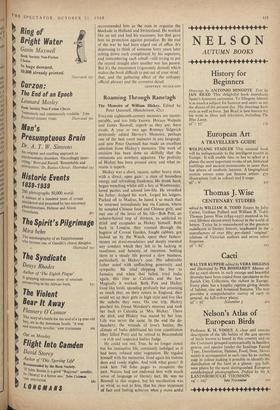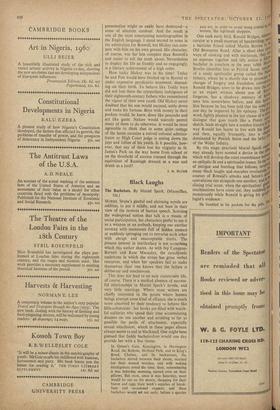Roaming Through Ranelagh
ENGLISH eighteenth-century memoirs are incom- parable, and too little known. Horace Walpole and James Boswell, superb as they are, have rivals. A year or two ago Romney Sidgwick dextrously edited Hervey's Memoirs, perhaps one of the best court memoirs in any language, and now Peter Quennell has made an excellent selection from Hickey's memoirs. The work of excision has been done so skilfully that the omissions are nowhere apparent. The prolixity of Hickey has been pruned away and what re- mains is superb.
Hickey was a short, square, rather heavy man, with a direct, open gaze: a man of boundless energy and refreshing frankness. He drank hard, began wenching whilst still a boy at Westminster, loved parties and adored low-life. He swindled his father, dodged his work, forged his ledgers. Packed off to Madras, he hated it so much that he returned immediately but via Canton, where he sampled Chinese food and Chinese girls, and met one of the loves of his life—Bob Pott, an auburn-haired imp of thirteen, as addicted to drink and escapades as Hickey himself. Both back in London, they roamed through the bagnios of Covent Garden, fought cabbies, got locked up by the Watch, spent their fathers' money on denti-mondaines and deeply resented any conduct which they felt to be lacking in manliness and honesty of intention. Settling them to a steady life proved a slow business, particularly in Hickey's case. His admirable father acted with unflinching generosity and sympathy. He tried shipping the boy to Jamaica and when that failed, tried India again, this time to Calcutta and the law.
Magically it worked. Both Pott and Hickey lived like lords, spending profusely but amassing so much that, on their return to England, they could set up their girls in high style and live like the nabobs they were. On one trip, Hickey pinched his friend Mordant's mistress and took her back to Calcutta as 'Mrs. Hickey.' There she died, and Hickey was seared by her loss.
Life was never the same. In the end the de- bauchery, the wounds of love's battles, the climate of India debilitated his iron constitution (they killed Pott) and he retired to Beaconsfield —a rich and respected Indian Judge.
He could not rest. True, he no longer rioted but his instinctive life, constantly indulged as it had been, refused utter vegetation. He regaled himself with his memories, lived again his riotous days and randy nights. And with what gusto! It took him 740 folio pages to recapture the past. Nature had not endowed him with much sense of language or literary tact. He was no
Boswell in this respect, but his recollection was so vivid, so real to him, that his clear statement of fact and feeling achieves what p. more artful presentation might so easily have destroyed--a sense of absolute candour. And the result is one of the most entertaining autobiographies in the English language. 1 stand second to none in my admiration for Boswell, but Hickey can com- pete with him on his own ground. His character, of course, was far less complex than Boswell's and easier to tell the truth about. Nevertheless to display his life so frankly and so engagingly, is a literary achievement of a high order. How lucky Hickey was in his time! Today he and Pott would have fetched up in Borstal or under expensive psychiatric treatment, depend- ing on their birth. To behave like Teddy boys did not lose them the sympathetic indulgence of their eighteenth-century fathers who remembered the vigour of their own youth. Old Hickey never doubted that his son would succeed, settle down and make his fortune. Boys with money in their pockets would, he knew, dress like peacocks and act like goats. Nature would scarcely permit many of them to do otherwise. It would be most agreeable to think that in some quiet cottage of the home counties a retired colonial adminis- trator or High Court judge is setting down the joys and follies of his youth. Is it possible, how- ever, that any of them lost his virginity in St. James's Park on the way home from school or on the threshold of success roamed through the equivalent of Ranelagh dressed as a nun and drunk as a lord?
J. H. PLUMB



















































 Previous page
Previous page